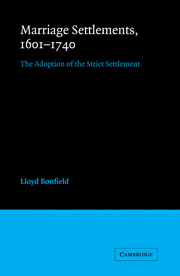Book contents
- Frontmatter
- Contents
- List of tables
- Preface
- List of abbreviations
- Introduction
- 1 The medieval inheritance and the Statute of Uses
- 2 Law in transition: the conflict over restraints upon alienation
- 3 Patterns of marriage settlement 1601–1659: the development of the ‘life estate-entail’ mode
- 4 The emergence of the strict settlement
- 5 The adoption of the strict settlement 1660–1740: Kent and Northamptonshire
- 6 Marriage settlements in perspective: the social and economic aspects
- Conclusion
- Bibliography
- Index
- CAMBRIDGE STUDIES IN ENGLISH LEGAL HISTORY
Conclusion
Published online by Cambridge University Press: 07 October 2011
- Frontmatter
- Contents
- List of tables
- Preface
- List of abbreviations
- Introduction
- 1 The medieval inheritance and the Statute of Uses
- 2 Law in transition: the conflict over restraints upon alienation
- 3 Patterns of marriage settlement 1601–1659: the development of the ‘life estate-entail’ mode
- 4 The emergence of the strict settlement
- 5 The adoption of the strict settlement 1660–1740: Kent and Northamptonshire
- 6 Marriage settlements in perspective: the social and economic aspects
- Conclusion
- Bibliography
- Index
- CAMBRIDGE STUDIES IN ENGLISH LEGAL HISTORY
Summary
The business of the historian is to illuminate and understand change over time. To accomplish the former is relatively straightforward assuming the appropriate evidence survives; to attempt the latter is always dangerous and sometimes even reckless. The focus of this study has been upon illumination: to chart the evolution in the legal form and financial arrangements embodied in marriage settlements over two centuries. In many respects the documents speak for themselves. We know that landed society, assisted by the legal profession, came to fix the transmission of the patrimony and the distribution of familial wealth, that is to produce what modern lawyers would call an ‘estate plan’, at a particular time: the marriage of the male heir.
Why they did so is less clear. The documents themselves are silent upon the matter, and the explanations of both contemporaries and historians are, when scrutinized, not altogether satisfying. Certain hypotheses which have been formulated by historians of the family concerning the emotional content of family relationships, if they could be substantiated by further research, may well explain this transformation in estate settlement.
For it is indeed inviting to attribute the changes discussed above to the development of ‘the closed domesticated nuclear family’ and the growth of ‘affective individualism’. The ‘estate plan’ which landed society adopted in the late seventeenth and early eighteenth centuries can be seen to have limited the patriarchal capacity of fathers by circumscribing their powers over disinheritance.
- Type
- Chapter
- Information
- Marriage Settlements, 1601–1740The Adoption of the Strict Settlement, pp. 121 - 122Publisher: Cambridge University PressPrint publication year: 1983
- 3
- Cited by

